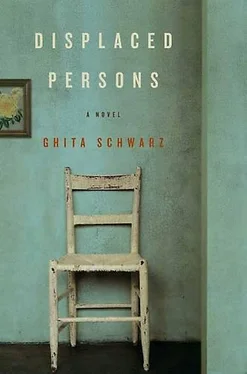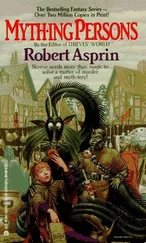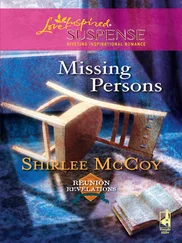“I!” cried the old man, the little rabbi, American but not American. “I am not a normal person!”
Fela hesitated a moment before Pavel’s leg, which stuck out, twisted, from the aisle; she lifted one foot and then the other, slowly, over him, balancing herself on the pew in front of her. She was in the aisle; she thought she saw a sign for an exit.
“So imagine,” continued the speaker. “Imagine what Tsipora was, with a child, a child who was murdered!” The lament hit the inside of Fela’s head, bounced against an ear. She came toward the sign, walking down the side, careful not to look into the rows of people, then squinted: EMERGENCY EXIT. No, no, that was wrong. It would set off an alarm. There must be something else, the door, the regular door. And yes, there was a soft red light calling exit, exit against the climbing wail of the little rabbi. Fela managed to push herself outside the door of the chapel and began shuffling along the wall, her hand skimming the molding for support, until she reached the elevator and stumbled in. It closed in on her; she felt her face break out in a sweat, a drip, mixed with face powder, falling toward her brows. When the elevator opened again, on the ground floor, she moved three steps into the carpeted lobby, felt her feet pressing heavily, her fingers turning to ice, her stomach lurching with fear, then stopping, then moving again, side to side, side to side-
She was on her knees, her torso bent forward, contorted, her hips straining to keep herself upright; someone’s hand was behind her head.
“Ma’am,” said a voice, a man’s voice. “You’re sick.”
“No, no,” she lied. “It’s fine, it’s my ankle, just.” She moved her head away, turned, shaking, still on her knees, to look at him. A heavyset man, brown face, perhaps Puerto Rican, older, gray hair curling out of his ears. Uniform. A security guard.
“Do you have family here? Somebody I can get for you?”
“No, my husband, but no, he will be disturbed, and it’s nothing.” She felt the carpet burning through her panty hose; she had landed on the soft part of her leg, just below the joint. Lucky. There was pain, but the pain of a bruise; nothing was broken. And her heart was beating fast, but normally; that, at least, was something.
“You don’t look too good.” He had helped her up; she was grasping at his jacket sleeve for steadiness. Her feet were solid; she could feel the floor. But at her hips there was still the strain, the weight of the upper body resting on her thin bones. “I’ll just call up and ask them to bring him down.”
“Yes, I’m sorry,” said Fela, quickly, “but no. It’s my ankle, always it bothers me, and also, it was hot. Air, just, I needed.” The guard led her to a bench outside. “Look,” she continued, sitting down carefully, navy skirt smoothed under her. “See? It’s better.” Her heart was light, floating. She rested her back against the granite wall of the funeral home.
He peered at her a moment. “There’s water inside. Would you like some?”
“Oh, yes, thank you,” she said. “Yes, thank you, sir,” she repeated when he returned, blue plastic cup in his hand. “It’s much better now. Thank you.”
She sipped and stared at the exercise club across the street, young people in bright pants moving their thighs on stair machines, tread-mills, stationary bicycles. So busy, the club, in the middle of a work-day. Strange. All watching a show on the television that hung above them. Commercials, mostly, she would guess, though she couldn’t see at that distance. Well, something to entertain. Everyone needed it. She tried to concentrate on the colors in the window.
“Difficult service, was it?” murmured the guard.
“Oh?” said Fela. “Oh, yes. I mean, not so much. But maybe a little long.”
“I knew it would be long when I saw them starting so early,” said the guard. “Usually they give it another half hour, even an hour or so before starting. It can be difficult, especially when-was she a good friend of yours?”
“A good friend?” Fela was startled by the question, the word good . “Yes, well-” She paused, then whispered, “The best. The best.”
“Yes, that’s very tiring. A friend that passes away, especially at our age-it’s like family, better than that sometimes.”
He looked to be at least a decade younger than her, but the mistake flattered her. “Yes,” said Fela. “I have to agree.”
“And when a lot of different people speak about it, it can do more harm to the mourners than good, if you ask me. Sometimes you have your own memories of the person, ones you don’t want to have mixed up with those of the others.”
“You know,” said Fela. “I have to agree with this also.”
FELA WAS FEELING SOMEWHAT better by the time the congregants filed outside. Still, she was glad for the extra moments to sit, waiting, the burn in her knees subsiding, while they all said their good-byes before stepping into the limousines for the cemetery. Pavel found her first.
What happened? he said. A reproach: she had left him.
Nothing, nothing, I just couldn’t stand it, she said, under her breath. He looked at her, suddenly suspicious, worried. All right now to be concerned! He would be in a bad situation if she died first, wouldn’t he? But she pushed a weak smile: It’s all right, Pavel, I’m fine.
Some of her friends stopped by to talk to her. What was she doing here? Was she all right? Of course she was, of course she was. Just a little hot inside, that was all. She leaned her neck upward to kiss Tsipora’s tearful grandchildren while her husband talked to the men. No less than six rabbis had spoken. Six . And what did they say, after all? She was surprised Pavel had sat through the whole thing, barely fidgeting. For rabbis he sat still, no matter how stupid.
She saw Fishl pausing at the limousines. Should he take his Oldsmobile out of the garage and follow the coffin to New Jersey, or jump into the limousines with one or another important personage? He was shifting from one foot to the other, deciding.
Pavel was more sure. He wanted to drive with Fishl, in the front. Fela watched her husband debating with his friend. She didn’t care, though she thought she would prefer the limousine. From the bench she watched the Budniks step into one.
Fela! called Vladka Budnik, her peach-colored hair stiff as a balloon. Fela! Take Pavel and come with us! It’s more comfortable, it’s more cool!
Pavel wants to go with Fishl! answered Fela.
Let him! grumbled Vladka’s husband.
Yes, let him, concurred Vladka. Just come with us yourself!
Fela shook her head. What if he doesn’t feel good?
But Pavel looked good, arguing vigorously, coughing once or twice. Vladka shut the limousine door. Pavel looked over at Fela, motioning with his chin. He thought she could read his mind, that’s what. Well, she could. But for once, she did not have to let him know. Let him ask her what she wanted to do. Let him acknowledge what was what. She had fainted, almost! A wife should be respected too.
Not that she had so much trouble from him. She was lucky, she really was. Vladka for years had complained about her husband, how stingy he was with her, how he expressed rage over the grocery bills and counted out change for her clothing. Once Vladka had even asked Pavel for money! Pavel was a generous man, thank God. No arguments on that front. Never. By now, after the disaster with the business and after his heart attack, it was Fela running the finances, as he could no longer concentrate at all, and his impatience got the better of him when he tried to decipher a bill. Fela knew how to do with the bills, and if Pavel felt put out, pushed aside, he did not complain too much, because, after all, what if she stopped?
Читать дальше











